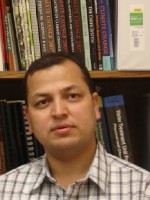Mohan B. Dangi

Mohan B. Dangi
The Johns Hopkins University, Ph.D.
Francois Fiessinger Scholar 2007
Assessing Municipal Solid Waste Streams to Illustrate Waste Composition and Generation Patterns
Solid Waste Management in Kathmandu, Nepal
Where Are They Now? Mohan is currently an Assistant Professor of Urban Systems and Environmental Policy at California State University, Fresno.
Project Description (while EREF Scholar):
Mohan’s research focused in understanding why repeated efforts of reorganization of SWM in Kathmandu have not worked. Previous studies of MSW in Kathmandu failed to expand their analyses beyond technical assessments of the problem. Because both the technical and physical issues and governing processes are involved in producing the MSW problem and in hampering the solutions that have been attempted, the true dimensions of the problem and the appropriate response cannot be determined by focusing on only one of these aspects. The research, therefore, was designed to illuminate both the institutional and socio-technical issues and analyze how they were interrelated.
The objectives of the research included assessing MSW streams to illustrate waste composition and generation pattern; understand technical and physical resources to tackle SWM; examine waste policies; investigate organizational arrangement, function, and capacity; verify domestic competence and qualifications and aid absorptive capacity; and scrutinize the efficacy of foreign aid in MSW projects. To do this, two large-scale sampling of MSW, household surveys, interviews, site inspections, and review of literature were used.
MSW generation in Kathmandu was 0.66 kg capita-1 day-1, where 71% of household waste consisted of organic wastes, and 1% was hazardous. The unit spending on SWM was 1.01% of per capita GNP, very high compared to peer cities. There are laws, policies, and guidelines covering SWM and yet the laws are not enforced and instead they are frequently repealed and replaced with new orders. Even with a 526.3% overall increase in salary in 1997/98, municipal workers are the lowest paid in the South Asia region. Almost half of all households directly dump wastes in the streets. Governance is poor with reports and charges of corruption. Foreign aid has historically failed to meet its objectives, and 97% of survey respondents with knowledge of aid blamed corruption for its ineffectiveness. SWM in Kathmandu serves as an example of the failure in that waste quantities are poorly understood, its management is very costly, laws are not implemented, resources are not coordinated and lack adequacy, governmental efforts need better governance, and foreign aid lacks the accountability to sustain its practices.



Biography:
Mohan was born in a small village in Nepal located 450 km west of the capital Kathmandu. He graduated with a BSc in Chemical Engineering in 1999 and an MSc in Environmental Science and Engineering in 2002 from the Colorado School of Mines. He then completed an MS in Geography and Environmental Engineering in 2005 and Ph.D. in Geography and Environmental Engineering in 2009 from the Johns Hopkins University.
Mohan brings over 11 years of international consulting and research work in developing countries. His research interest encompasses across municipal solid waste management, urban-rural interface issues, water/wastewater, and environmental change in mountain ecosystems. While at the Colorado School of Mines and National Renewable Energy Laboratory, he was instrumental in establishing two engineering curricula at Tribhuvan University and developing renewable energy curriculum for K-12 in Nepal. He has consistently tackled environmental issues in Nepal, thus completing four projects, instigating five memoranda of understandings between the US and Nepali universities. Mohan is currently an Assistant Professor of urban systems and environmental policy at California State University, Fresno.
Research Publications:
Dangi, M.B., M.A. Urynowicz, S.B. Belbase, and B.P. Pokharel. Solid waste generation in Tulsipur Municipality, Nepal. J. of Waste Management & Research. To be submitted.
Dangi, M.B. Waste management in Kathmandu: A legacy of futile planning and wasteful aid. Habitat International. To be submitted.
Dangi, M.B., C.R. Pretz, M.A. Urynowicz, K.G. Gerow, and M.R. Junna. 2009. Solid waste generation in Kathmandu, Nepal. J. of Environmental Management. In Review.
Dangi, M.B., R.R.H. Cohen, M.A. Urynowicz, and K.N. Poudyal. 2009. Searching for a way to sustainability – technical and policy analyses for solid waste issues in Kathmandu. Waste Management & Research. Vol. 27, 295-301.
Dangi, M.B., M.A. Urynowicz, K.G. Gerow, and R.B. Thapa. 2008. Use of stratified cluster sampling for efficient estimation of solid waste generation at household level. Waste Management & Research. Vol. 26, 493-499.
Dangi, M., M. Urynowicz, and R. Cohen. 2006. Kathmandu’s solid waste: Engineering and policy analyses. International Solid Waste Association Annual Congress 2006. “Waste Site Stories”. October 1-5, 2006. Copenhagen, Denmark. 10 pp.
Bhattarai, R., R. Cohen, M. Dangi, and A. Walker. 2004. Efforts on building human capacity through curriculum development and renewable energy in Nepal. Proceedings of the World Renewable Energy Congress VIII (WREC 2004), 29 August – 3 September 2004, Denver, Colorado (CD-ROM). [Amsterdam]: Elsevier, Ltd.; Monterey, CA: Produced by InControl Productions, Inc. 5 pp.; NREL Report No. CP-710-36842.




